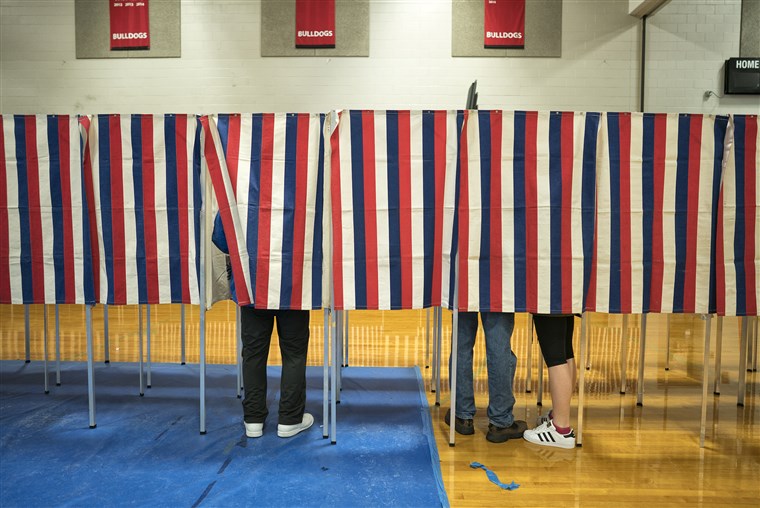I’m not asking what candidate you support. What I am asking you to consider is what does your vote constitute?
This question was spurred by Jeff Bilbro’s thought-provoking essay here at FPR. And I don’t necessarily take exception to what he wrote. I will take exception to something he ascribes to his friends. In his Q&A with Mr. Carroll, he wrote, “I have friends who tell me that voting for a third-party candidate is just throwing away my vote.”
I do endorse Bilbro’s response to his anonymous friends that third-party voting is an effective means of communication. However, I think something more needs to be drawn out about what it means to vote in this particular nation. I’ll state my thesis clearly: voting is NOT about winning an election. Casting a vote is saying, “I want this person to represent me as my proxy.”
With everything going on in this current polity, it’s a wonder anyone can still find it within themselves to support the people who present themselves in the two-party system. Motivations for voting vary, but let’s examine this notion that our vote can be thrown away.
Casting a vote for a third-party is not fruitless because winning an election is not what voting is ultimately about. When all votes are counted, who won is a byproduct of an American citizenry voicing who they want to represent them. Voting is a form of endorsement, an act of public witness; it is not a chip to pile with others in hopes of winning.
If citizens are voting for the purposes of winning, they’ve accepted bad political rhetoric. In an interesting, but slightly dated, New York Times article, still-relevant research by Casey Mulligan and Charles Hunter shows the chances of someone’s vote actually impacting an election is astronomically small. Mulligan and Hunter analyzed at least 56,000 Congressional and state-legislative elections going back to 1898. Here are some of their findings:
- Median margin of victory in Congressional elections was 22 percent.
- Median margin of victory in state-legislative elections was 25 percent.
- In 121 years only seven elections were decided by one vote.
- In 16,000 Congressional elections only one was decided by one vote (1910).
The Times article also pointed out that in close high-profile elections, the voters don’t decide.
The closer an election is, the more likely that its outcome will be taken out of the voters’ hands — most vividly exemplified, of course, by the 2000 presidential race. It is true that the outcome of that election came down to a handful of voters; but their names were Kennedy, O’Connor, Rehnquist, Scalia and Thomas. And it was only the votes they cast while wearing their robes that mattered, not the ones they may have cast in their home precincts.
Yes, there is a collective result. That’s irrefutable. But I contend that the result should not be our motivation. We have the hard-fought privilege of voting in the United States in order to communicate who we each say should be our representative; when our vote becomes part of a calculation regarding who we think can win, we lose an opportunity to communicate who we actually want to represent ourselves.
To the objection that if I don’t vote for someone who has an actual chance of winning, aren’t I relinquishing control of government to people I don’t want to represent me? To those folks, I’ll ask if they feel they have any control over our federal government now or in the last several decades. The evidence is starkly contrary, in my opinion, that voting allows U.S. citizens to have any control over government. If we are voting to win, then our vote is very nearly meaningless.
To the objection that voting is the way a citizenry exercises accountability, I’ll give you Jennifer Victor’s thoughts, with whom I agree. She is an associate professor of political science at George Mason University. She wrote in the Mischiefs of Faction blog: “There are good reasons to vote and good reasons to hold elections, but ‘because that’s how we hold representatives accountable’ is not one of them. There are at least three big reasons why elections are imperfect mechanisms of accountability: limited agency, limited cognition, and oversensitivity.” For her full explanation of these three reasons, here’s the blog post where they appeared.
For me, this came to a head during the last presidential campaign and election. Notwithstanding the pleas of many of my evangelical brothers and sisters, I took a stand and refused to vote for either of the two front-running presidential candidates because neither one represented me. I voted for a third-party candidate who came the closest to representing me. In my mind, that’s not only meaningful, but communicates to the larger system. In no way did I feel my vote was wasted.
There’s also a significant reason this is important to me. I claim to be an evangelical Christian. I believe I am accountable to God for my actions. An important action I take is when I endorse someone with my vote and, if elected, authorize that candidate to represent me in my stead. If I vote for someone, I’m saying this person’s actions represent me. Therefore, I’m also held accountable, to a degree, for what my representative does in office since I endorsed them as my proxy.
To those who claim that it is a civic duty to vote, I don’t believe there is a duty to vote. There is a right to vote, but no duty. You can’t force (socially or otherwise) me to vote for someone who does not represent me. That’s coercion worthy of the worst regimes we may point to. But, if you can find a candidate who you feel good enough to say, “this is my proxy, this person will make decisions for me on my behalf,” then by all means vote for them even if they don’t belong to either of the major political parties. But, for goodness sake, don’t vote with a tabulation of ballots in mind.






12 comments
Martin Schell
PS: I wanted to vote for Rocky Anderson for prez in 2012, but he wasn’t registered as a write-in candidate in California. Say what? Yeah, that’s what I thought: you have to register? But the requirement makes a lot of sense. Suppose I cast a write-in for Dan Grubbs for president. The Election Commission would then rightfully ask, “Which Dan Grubbs? A lot of citizens here have that name.” So you must register.
Martin Schell
Lots of good stuff here, and thanks for reminding me to read Jeff’s article again.
Brian: NO vote method actually occurred in Laos back around 1990 when I lived in Thailand and got direct news about their neighbor. This was an innovation for one-party state Laos. Basically if you got >50% no, you were embarrassed and resigned even though there was no individual who “beat” you in the vote tally.
Jon Cook: Blank ballot is a protest vote and a clear example of wasting a ballot. It is actually illegal here in Indonesia to promote blank ballots in public discourse.
Other systems such as ranked voting have been proposed. But they don’t directly address the Tweedle Dum/Tweedle Dee similarity of major candidates.
Let’s review:
1. After Democrats nominated their last actual liberal for president (George McGovern, who got whooped by Richard Nixon two years before Dick resigned), they decided to institute “superdelegates” to counterbalance the “masses” who might select someone outside the mainstream in the primaries. Republicans never resorted to that un-Democratic trick.
2. In 2012, Obama got re-elected with only something like 28% of the electorate, roughly 53% of votes x 53% turnout. Turnout for president hasn’t exceeded 60% since… um, don’t get angry, ladies … women got the right to vote in national elections. It was much higher before the 19th amendment, ever since the 1820s when most white men were granted the right to vote (no property requirement).
3. As Jeff duly noted and Dan at least implied, the two major parties hype each election with dire warnings about what will happen if the other team wins. This inevitably leads your friend to look at you with a dog-faced serious expression on his or her face that “how could you possibly not vote against the bad guys?”
4. There is a clear historical precedent for a new party emerging that was not on the national scene previously. It’s called the Republican party victory of Lincoln in 1860 (even though that party began a few years earlier). How else will new parties start if not from getting support by people fed up with the two slothful giants?
Finally, to resonate with Dan’s spiritual orientation, let’s consider that democracy is based on something like the Golden Rule: if you can’t support the government when your side’s candidate loses, how can you expect “the other people” to support it when your candidate wins?
Dan Grubbs
Thanks for the comment, Mr. Cook. Your suggestion is another that helps us get out of a binary mentality when it comes to elections and hopefully realize that our primary reason to vote is not about winning.
Jon Cook
Nice essay. There is an option besides not voting if there is no suitable candidate to select: turn in the ballot with nothing marked in that race. Indeed, most of our ballots have many many races on them, and it’s no shame to leave some of them blank. We should, if we haven’t done our homework and evaluated the candidates. Somewhere there will be a datum that indicates that there were X number of ballots submitted in a precinct, but only Y (less than X) votes totaled among the candidates. X-Y is, in some way, the number of NO votes.
Brian
“X-Y is, in some way, the number of NO votes.”
Nah. There are plenty of reasons to leave a slot blank. Maybe you don’t care about the office. Maybe you don’t really care either way between these two candidates, because they’re both fine. Maybe you don’t really care either way between these two candidates, because they’re both awful. My proposal for “NO” is to be an affirmative statement that you want both of these candidates to lose, and to have neither one fill the office.
Dan Grubbs
Morning Brian:
I am intrigued by your “no” vote option as a means of communicating. I could see that as a possibility if the rules also stipulated that the candidates who did not win cannot run in the subsequent election.
Regarding my view on accountability, as I see it, voting is no different than any other action I do before God. I’m accountable for what musical performers I support, for example. I’m not holding them to an expectation of perfect behavior, I’m saying I am supporting a means to do whatever they do. I am endorsing what they do by buying a recording. That’s not me holding a musical performer (or candidate) to a high standard, that’s me applying the appropriate weight to my decision to buy or vote. I know the weight of this decision before I make it and chose or not chose to do so in an informed manner.
Brian
“I could see that as a possibility if the rules also stipulated that the candidates who did not win cannot run in the subsequent election.”
Ooh, that’s a good one. Anything with some teeth in it that would promote candidates and parties building up their own support, rather than just tearing down their opponents until they are barely preferable, would be steps in the right direction.
I honestly have no idea how you can partake in any entertainment at all, given your standards.
Karen
I refer to the author’s position as Vanity Wank Voting. If you vote for someone who cannot possibly win, then you really are wasting your vote. In anything about city council elections, either a Democrat or a Republican is going to win. There is no other result possible in our current system. Voting for some moron on the I Am Too Pure To Sully Myself By Winning Party means, usually, that the Republican wins and exercises power in a way to harm everyone who isn’t a billionaire white male. FPR is supposed to favor localism and environmentalism; voting third party is a vote for financial bailouts and mountaintop removal. Power is going to be used; the question is how and by whom. You two have deluded yourselves into thinking that the winner will care how few people vote. If low turnout elections pricked the winners’ consciences, we would not see such enthusiastic efforts to keep people from voting. Winning with a tiny margin is still winning and the winner gets the power.
In summary, grow up.
Brian
If you want to vote straight Democrat to prove what a liberated, free-thinker you are, by all means, do that.
People should be free to vote however they want, and not be bullied by the likes of you.
“Voting for some moron on the I Am Too Pure To Sully Myself By Winning Party means, usually, that the Republican wins…”
This of course has no connection to reality.
“…and exercises power in a way to harm everyone who isn’t a billionaire white male.”
Most billionaires are Democrats. Democrats represent the 10 wealthiest Congressional districts, and 41 of the wealthiest 50.
Karen
Then you’re a Republican, and your defense of third party voting is a rational effort to make sure your side gets all the power.
Brian
Trolls need to at least pretend to know the regulars. It’s not any fun for anyone otherwise. Have a nice life!
Brian
I am a very strong proponent of not voting and/or voting third party. I think low turnouts are damning for the politicians in office, NOT for the public. High turnout means the population endorses the system as the legitimate representation of power, and low turnout signals the lack of popular support, and hence lack of legitimacy.
I do not agree with you here:
“If I vote for someone, I’m saying this person’s actions represent me. Therefore, I’m also held accountable, to a degree, for what my representative does in office since I endorsed them as my proxy.”
It sounds like you are expecting moral perfection, and giving your vote way too much power to the extent that I don’t see how you could ever vote for anyone. A vote is simply your mark that you support this person for this office at this time. It means they represent you in office, but they don’t represent you personally in any way, not on that day or any other day.
There are many proposals for changing how elections are held, most have partisan/ideological motivations. I kind of like the idea of having “NO” on the ballot for every position. If NO wins, the office is vacant until a new election can be held, and the parties better put of more attractive candidates. As it is, they are incentivized to do whatever it takes to win, rather than to have broad support–winning with 10% of the vote to 9%, with 10% turnout, is better than getting 49% to 51% with 90% turnout, after all.
Comments are closed.